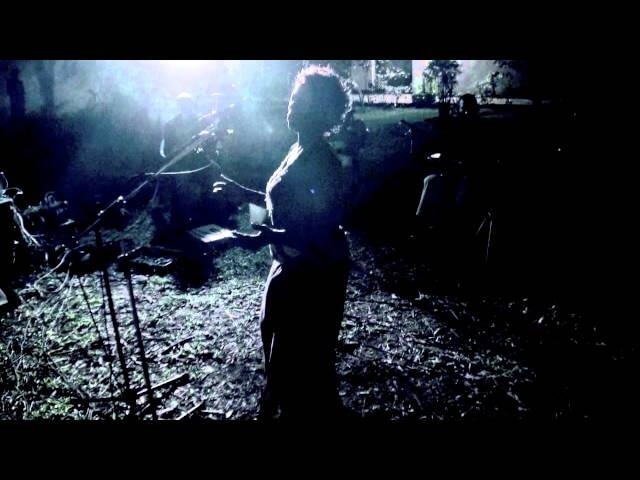LPs from the Congo, Canada, and Milwaukee

Death Blues, Non-Fiction
It’s always bummed me out that Pele—a great, Milwaukee-based post-rock band that formed in the late ’90s and originally included former Promise Ring bassist Scott Beschta as well as future Promise Ring bassist Scott Schoenbeck—was never better known. But Pele’s drummer, Jon Mueller, has kept busy with various projects since then, including Collection Of Colonies Of Bees and the Bon Iver side project Volcano Choir. Mueller’s latest outfit, Death Blues, is proof of just how far he’s evolved. Death Blues’ new album, Non-Fiction, isn’t post-rock, nor does it sound anything like Pele’s bubbly, jazzy instrumentals. Instead it comprises two tracks, each in the 17-minute range, that drone and spiral in tribal ecstasy. The instrumentation is stark: Mueller plays drums and percussion with a primal yet intricate feel, while his bandmates Ken Palme and Jim Warchol provide hammered acoustic guitar (that is, guitars played with drumsticks and brushes instead of finger or picks), most of which is treated and looped to varying degrees. Mueller also sings, although his voice is used more as a source of syllables and tones that are then layered into a fugue of mantras and incantations. The band may be called Death Blues, but neither death nor blues figures prominently into it; Non-Fiction is alive, at times achingly so, and the record’s overall heaviness still allows room for bursts of light as well as deep shadows. The album is being released by SIGE, the label co-owned by Hydra Head Records co-founder and former Isis frontman Aaron Turner. I’ve come to trust Turner’s taste in music over the years, and Non-Fiction only reaffirms that. Now someone just needs to make a Pele reunion happen. [Jason Heller]
Kasai Allstars, Beware The Fetish
I’ve always been a huge fan of the Congotronics series, which Crammed Discs says “is devoted to the strange and spectacular electro-traditional mixtures, which are being concocted in the suburbs of Kinshasa, Congo.” Kasai Allstars’ new record, Beware The Fetish, is the fifth album in the series, and while it’s probably not my favorite (I think that’s the first Konono No. 1 record), it’s still fairly exceptional. The Allstars mod out all their instruments to buzz and hum, and the levels of distortion all those misplaced wires and magnets add to Kasaian drums and electric likembes (thumb pianos) really make the whole thing sound distinct, especially to listeners with tame, western ears. It’s an amazing musical exploration for any listener at any time, though I’ve personally found that it sounds best while I’m working. The percussive tunes are enough to keep me typing, but the melodies aren’t abrasive enough to distract. [Marah Eakin]
Constantines, Shine A Light reissue
During Constantines’ mid-2000s heyday, history was set against the Toronto-based quintet: Never stylish enough to get a boost in profile from revived interest in garage rock or post-punk; too few people on stage playing too-taut songs to capitalize on the brief craze for Canadians with guitars. The band’s sophomore effort, Shine A Light, is one of the best records issued by Sub Pop in the ’00s—but it had the misfortune of coming out in 2003, when a greater amount of praise and attention was focused on other best Sub Pop releases of the ’00s by The Postal Service, The Shins, and The Thermals. Of the four records, Shine A Light has aged the best, with its recent reissue presenting an alternate take on indie rock’s O.C.-soundtrack-and-magazine-cover era. The sweaty rush of the band’s live shows is captured in the opening one-two-three punch of “National Hum,” “Shine A Light,” and “Nighttime/Anytime (It’s Alright)”—that third track serving as a pummeling, stop-start mission statement for a band that could seemingly only exist after sundown. Shine A Light shows considerable pop chops beyond the noise and the barstool narratives, too—witness “On To You,” the catchiest Kill The Moonlight-era track Spoon never recorded, right down to the wordless “ooo-ho-oh-oh”s in the intro. And while the gravel in Bryan Webb’s throat will always draw parallels between him and Bruce Springsteen, Shine A Light marks Webb and company as a band beyond comparison. (Because what really makes the record stand out are the never-showy, always essential splashes of keyboard from Will Kidman, who joined the band between its self-titled debut and Shine A Light.) And now that vinyl copies of the record are back in circulation for the first time since 2007, the rest of history can know that as well. [Erik Adams]